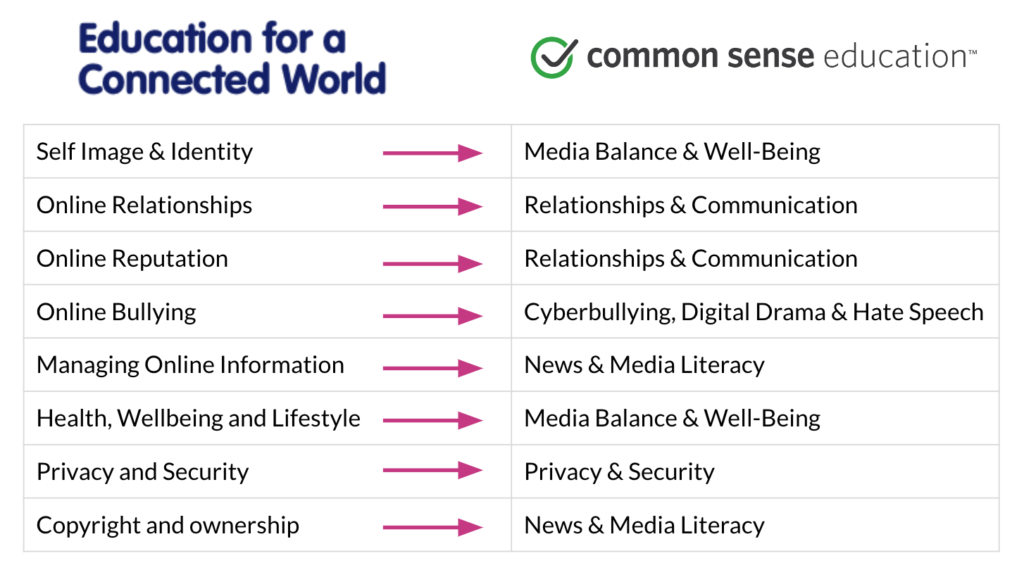Digital Literacy and Online Safety (Year 3)
National Curriculum Links - Computing KS2
The content of this plan cover the following NC strands:
- use search technologies effectively, appreciate how results are selected and ranked, and be discerning in evaluating digital content
- select, use and combine a variety of software (including internet services) on a range of digital devices to design and create a range of programs, systems and content that accomplish given goals, including collecting, analysing, evaluating and presenting data and information
- use technology safely, respectfully and responsibly; recognise acceptable/unacceptable behaviour; identify a range of ways to report concerns about content and contact.
Why this? What does it build on?
This unit builds on important online safety messages that will be delivered in Key Stage 1. Students cover a range of age-appropriate online safety and digital literacy themes in Keeping safe and exploring technology (Year 1) and Keep safe and create (Year 2). As the students enter Key Stage 2, the themes they learn about in this unit widen to include; screen time issues, privacy, digital footprints, online communities, online bullying and copyright principles.
What comes next?
The digital literacy content in this unit will be built upon and continue in even more depth with our Digital Literacy and online safety units for Year 4, Year 5, and Year 6.
Other units also include online safety and digital literacy messages, such as Communication and collaboration, Computational thinking - Alien contact, Building Collaborative websites, Manipulating images and Inside the internet.
View our full curriculum map
Take a look at our full curriculum map to see how units across all year groups, from Year 1 to Year 6 link.
A note about this unit
![]()
The lessons in this unit or work are taken from Common Sense Education’s excellent Digital Citizenship curriculum. Their resources are shared for free under A Creative Commons Attribution- NonCommercial- NoDerivatives 4.0 International License. As a result, this plan can be accessed without logging into our site and is FREE FOR ALL TO USE. It can be shared and used by anyone under the terms of that license. The original materials can be found at: https://www.commonsense.org/education/uk/digital-citizenship
Education for a Connected World
The Education for a Connected World framework describes the Digital knowledge and skills that children and young people should have the opportunity to develop at different ages and stages of their lives. It highlights what a child should know in terms of current online technology, its influence on behaviour and development, and what skills they need to be able to navigate it. Common Sense resources are recommended in the Education for a Connected World framework as essential skills for today's learners. Both resources together, along with Project Evolve, provide you with an excellent set of tools to deliver a comprehensive online safety and digital literacy curriculum.
Education for a Connected World's strands align with Common Sense Education's Digital Citizenship strands in the following way:

Look out for more detail in each of the lessons in this unit, about the strands and statements from Education for a Connected World that link to each lesson.
Unit Resources
Key vocabulary for this unit
Attention - noticing someone or something as important
Community - people who share a common neighbourhood, background, or interests
Concentration - giving your full attention to a specific activity
Credit - giving recognition to a person that created something
Digital footprint - a record of what you do online, including the sites you visit and the things you share
Distraction - something that keeps you from giving your full attention
Internet - a worldwide network that connects people using computers, phones, or other devices
Online - using a computer, phone, or tablet to visit a website or app
Permanent - something that lasts forever
Private - something that you should keep to yourself
Private information - information about you that can be used to identify who you are
Respect - showing that you appreciate someone
Related units
Digital Literacy and Online Safety (Year 8)
About this unit Six lessons taken from Common Sense Education’s excellent digital citizenship curriculum, covering a wide range of topics…
Digital Literacy and Online Safety (Year 7)
About this unit Six lessons taken from Common Sense Education’s excellent digital citizenship curriculum, covering a wide range of topics…
Digital Literacy and Online Safety (Year 6)
About this unit: Six lessons taken from Common Sense Education’s excellent digital citizenship curriculum, covering a wide range of topics…
Digital Literacy and Online Safety (Year 5)
About this unit: Six lessons taken from Common Sense Education’s excellent digital citizenship curriculum, covering a wide range of topics…
Digital Literacy and Online Safety (Year 4)
About this unit: Six lessons taken from Common Sense Education’s excellent digital citizenship curriculum, covering a wide range of topics…
Keeping Safe and Exploring Technology
You need to be logged in to view this content. Please Log In. Not a Member? Join Us
